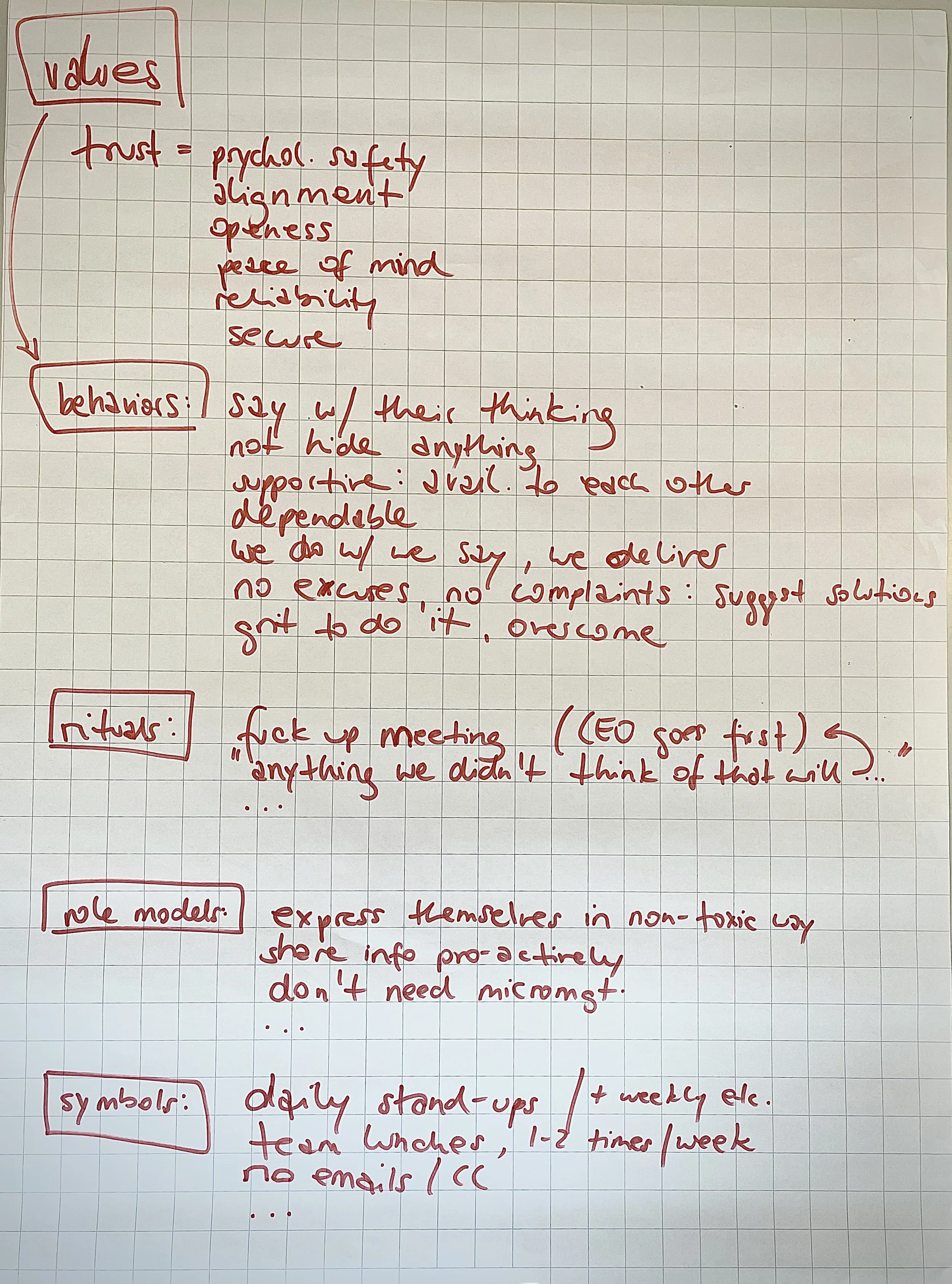Listen Up Founders: Culture Starts With You
Let’s explore the critical role of founders in shaping company culture. This myth needs to be blown first: culture is not (just) values; a set of values does not define the culture. 🤯
Values are a fundamental part of culture, yes. But culture is much more formed by behaviors, intentional activities, and visible symbols.
Founder-led culture is crucial, particularly in the early stages, and it can be incorporated into many practices to make hiring easier, strengthen team cohesion, and improve overall performance.
This article will give you the practical steps to translate values into action, helping you begin your journey towards creating a thriving and cohesive team culture. Let’s kickstart your Culture today, shall we?
Content
Culture Goes Beyond Values: Rituals, Heroes, and Symbols
During the Early Stages, Culture is Always Founder-Led
Why Putting Culture at the Center Pays Off
Your Kickstart for Today: Turning Theory into Practice
In a Nutshell: Your Blueprint to Your Unique Team Culture
1. Culture Goes Beyond Values: Rituals, Heroes, and Symbols
Culture starts with values, but it is much more than that. Values are the foundation upon which culture is built, but to truly shape a company's environment, the founder(s) must articulate their values into specific, observable behaviors.
These behaviors then need to be translated into operational practices that guide daily actions and decisions within the company. And this translation is not a one-time event; it involves ongoing, intentional efforts.
Recurring activities, or rituals, play a crucial role in this process. These can include regular meetings, team-building activities, and company-wide events reinforcing the core values.
Role models within the organization, or culture heroes or culture multipliers, are also essential. These individuals exemplify the desired behaviors and embody the company's values, inspiring others to follow suit.
Tangible tokens, or symbols, help make the culture visible and understandable even to outsiders. These can be anything from the design of the workspace, the tools you use, and the language used in communications to how successes are celebrated.
💡 Read on to see further below how a founder created their first draft of culture practices in one of my workshops – and access a free template to do it, too.
Creating a solid company culture is work and a process that requires continuous effort and intentionality. It's not enough to state your values; they must be weaved into the very foundations of your organization through consistent reinforcement and intentional activities.
It's work and a process!
2. During the Early Stages, Culture is Always Founder-Led
In the early stages of a start-up, culture is invariably founder-led. You establish the atmosphere and represent the values that the rest of the company will adopt.
As the company expands, the CEO and other top-level leaders become essential in upholding this cultural direction. If you are the CEO, you must serve as a role model, demonstrating the desired behaviors and ensuring these behaviors are reflected throughout the organization – because people are always watching what you do (or not) and how you do it.
You can't delegate this responsibility, especially not during growth. The leadership's commitment and integrity to the company culture are key to keeping the culture alive as the company grows. You always are a special beacon in leading with 'desired' behaviors.
You cannot get rid of it!
3. Why Putting Culture at the Center Pays Off
Putting Culture into the center of your people management activities helps your business in many ways:
→ Less struggle to hire the right people
→ More confidence in making these hiring decisions
→ Complimentary instead of mini-me teams (=better products!)
→ Gluing a team together that will stick together (esp. the rough times)
→ A team that operates on a culture flywheel and outperforms competition
Leading with a culture focus in your management practices significantly improves business processes, making hiring easier and building creative, cohesive teams.
It’s a true competitive advantage!
4. Your Kickstart for Today: Turning Theory into Practice
During a recent workshop, we hands-on implemented these principles. We took one of the values a founder wants to lead his team by: “trust”. We then translated this value into actionable steps across the various layers of culture.
Here is what that first draft looks like:
We thoughtfully went through all the culture layers:
Describing and articulating the desired behaviors we want our team to display in their daily collaboration
Thinking of intentional rituals to form these behaviors
Describing how culture heroes (role models) will display the desired behaviors as the ideal resemblance of our culture
Adding intentional (team) activities as visible and clear tokens of culture for outsiders
Using this baseline and approach, with my guidance, the founder developed a first approach to their culture-forming strategy that was not only practical and simple, but also immediately implementable — it only took us just 10 minutes of knocking out ideas and writing down the good ones. Boom!
It’s easy to get started – don’t over-engineer!
Use my Culture Cornerstones Design Sheet as a structural template to articulate your desired behaviors and culture practices today:
6. In a Nutshell: Your Blueprint to Your Unique Team Culture
Creating a successful and strong team culture starts with the founders' commitment to translating values into actionable behaviors and daily practices – and living them as the ultimate culture hero from an early-stage and through growth.
That means looking at all layers of culture intentionally and designing Culture Cornerstones with recurring rituals, true role models, and visible symbols. And then to keep working on these, testing them, iterating, and (re-)shaping the daily practices so that culture keeps fueling team performance and business success.
By intentionally weaving culture into the core of your people management activities and overall operations from product to delivery, you will ease hiring, strengthen teamwork, and improve the team’s performance, to just name a few positive effects.
It’s not rocket science to get started. But when you do, your team will truly take off together!
🚀
Looking for help with becoming intentional about your culture? I am here for your culture kickstart:


